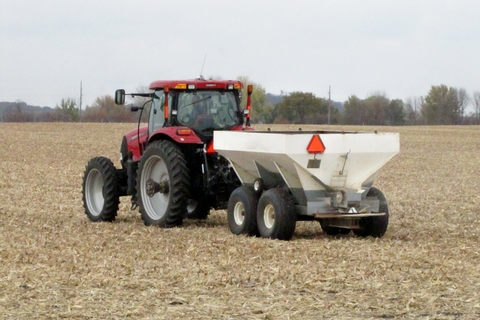Nitrogen Smart is an educational program for producers that presents fundamentals for maximizing economic return on nitrogen investments while minimizing nitrogen losses.
Fundamentals
Nitrogen Smart Fundamentals delivers high-quality, research-based education that covers:
- Sources of nitrogen (N) for crops.
- How nitrogen is lost from soil and how you can reduce losses.
- How to manage nitrogen in drainage systems.
- What the Nutrient Reduction Strategy and Nitrogen Fertilizer Management Plan mean for Minnesota producers.
- Practices to refine nitrogen management, including split applications, alternative N fertilizers, soil and tissue testing and N models.
Nitrogen Smart certification is valid for three years after participants complete the fundamentals course.
Register for online or in-person courses using the links under "Upcoming and ongoing events" on this page.
Nitrogen Smart online
The fundamentals and advanced courses are offered online as self-paced courses. You may return anytime if you need to leave the course before you finish. Your progress is automatically saved and you should return to where you left off.
Thanks to the generous support of the Minnesota Corn Growers, there is no charge for the Nitrogen Smart courses. Manure management and The 4Rs are also offered online. Take the Fundamentals course before any of the advanced training.
Manure management
A 3-hour, detailed look at the nitrogen component of manure. Take maximum economic and fertility advantage of using manure as a fertilizer source, while minimizing N loss to the environment. Training covers forms of N found in manure, N concentration, the nitrogen cycle and manure, application timing, sidedressing manure, regulations on application, and the effect of cover crops on retaining and recycling N from manure.
When this course is offered in person, participants can earn three CCA-CEUs: 2 nutrient management (NM) and 1 soil and water (SW).
A deep dive into the 4Rs
A deep dive into the 4Rs starts where the fundamentals of Nitrogen Smart end, with a detailed discussion on N rate, the contributions from soil, and the stress from climate factors.
The 4Rs were developed in collaboration between university researchers and the fertilizer industry during the late 1980s. They promote a nutrient management approach that balances crop productivity with environmental preservation:
- Right rate: Nitrogen rates have the potential to make the largest impact on both crop production and the environment. The key to optimizing rates is to follow university N guidelines, use soil nitrate-N tests when appropriate, and scout for deficiencies.
- Right source: Once in a plant-available form, the plant doesn't distinguish one N source from another. However, there are differences in how N fertilizers interact with the environment, which can affect both availability and loss.
- Right time: The nutrient supply should be synchronized with crop demand and uptake. Several factors influence N availability, including fertilizer source, using stabilizers or inhibitors, and field conditions. Together they help determine when it's most appropriate for that particular N source to be applied.
- Right place: Nutrients should be placed where the crop can use them. Consequently, the application method is important for optimum fertilizer efficiency.
When this course is offered in person, participants can earn three CCA-CEUs: 2 nutrient management (NM) and 1 soil and water (SW).
Advanced Nitrogen Smart courses
Adapting N management to climate
The effectiveness and advantages of various N management practices are dependent on climatic conditions. Furthermore, N loss is driven by water (specifically soil saturation). This training looks at average climate conditions including soil temperature, soil moisture status, precipitation, and evapotranspiration with an eye on the calendar date. We'll discuss the implications of deviation from average with regard to adjusting N management practices based on condition.
CCA-CEUs: 2 nutrient management (NM), 1 soil and water (SW).
Preventing nitrate loss to water
Watershed plans have been developed for all of Minnesota that set goals for the reduction of nitrate in surface water. Additionally, some parts of Minnesota are dealing with high nitrate levels in groundwater. Individual farmers, and the industry as a whole, are being asked to make changes that will positively impact water quality. This session explores the effect of N fertilizer management, edge-of-field practices (such as bioreactors and saturated buffers), and cropping system practices (like cover crops or changing crop rotations) so that individuals can determine whether practices will work on their farms, and which are the best fit.
CCA-CEUs: 3 soil and water (SW).
Biologicals and nitrogen management
The use of biologicals in agriculture, specifically in corn production, has been debated recently. Many of the available biologicals are based on microorganisms isolated from the soil near corn roots. In this session, we will discuss the different types of biologicals, what they are and what they are supposed to do. We'll talk about challenges related to using biologicals and potential benefits or limitations for their use in corn.
Variable rate nitrogen
The optimum N rate varies based on many factors, including soil, climate, pests and other variables that are difficult to determine. This variability is not just from year to year or field to field. The optimum rate can be different from one spot in a field to another.
The technology to apply at variable rates has been around for a couple of decades, but the ability to reliably predict exact N needs at any given location remains a work in progress. This session will review several of the methods that have been tried, as well as the research evaluating them. The biggest takeaway, however, may be a philosophical one related to how we define success.
Upcoming and ongoing events
Self-guided, online course
Self-guided, online course
Self-guided, online course


